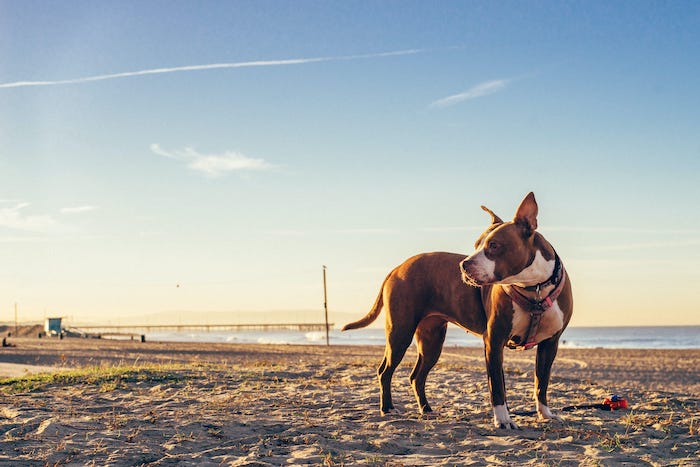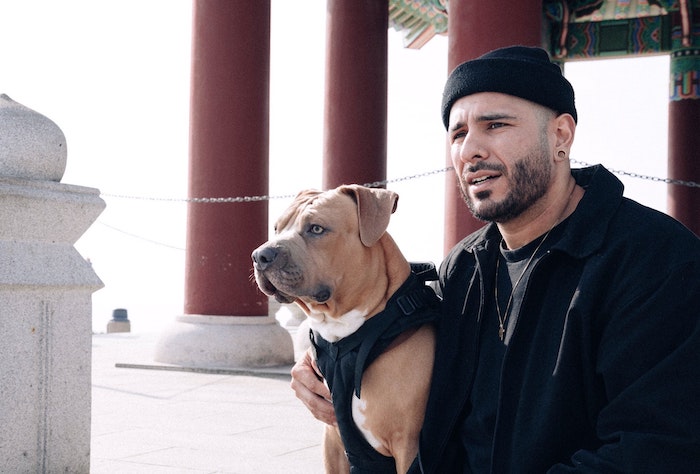If you live in Los Angeles, plan to visit or are looking to relocate to the city, here is some helpful information that might be beneficial to all of you dog owners.
Do you need to register your dog with the city of Los Angeles?
Dog owners in the city of Los Angeles are required to register their dogs with the Los Angeles County Department of Animal Care and Control (DACC). Dog registration helps ensure that lost dogs can be returned to their owners quickly, and it also helps support animal control and public safety efforts.
To register your dog in Los Angeles, you will need to provide proof of rabies vaccination, as well as payment for the registration fee. You can register your dog in person at a DACC animal care center, or you can register online through the DACC website.
It’s important to note that registration requirements and fees may vary depending on your location, so it’s a good idea to check with your local animal control agency or city government to find out more about the specific requirements for dog registration in your area.

What businesses in Los Angeles allow dogs inside?
There are many businesses in Los Angeles that allow dogs inside, including pet stores, some restaurants, and some retail stores. However, it’s important to note that the policies on allowing dogs inside can vary widely depending on the specific business and location.
Here is a list of just some businesses in Los Angeles that are known to allow dogs inside:
- Petco and PetSmart: These pet stores allow dogs inside, and many even offer in-store services like grooming and training.
- The Grove: This outdoor shopping center allows dogs on a leash in the common areas, and some of the stores also allow dogs inside.
- Shake Shack: This popular burger chain has several locations in Los Angeles that allow dogs on the outdoor patio.
- The Lazy Dog Restaurant & Bar: This restaurant chain specializes in dog-friendly dining, and they have several locations throughout Los Angeles.
- The Original Farmers Market: This historic marketplace in the Fairfax district allows dogs on a leash in the common areas, and some of the food vendors also allow dogs inside.
It’s always a good idea to check with the specific business before bringing your dog inside to make sure they have a dog-friendly policy and to confirm any restrictions or requirements they may have.
How many dog parks does Los Angeles have?
The number of dog parks in Los Angeles can vary as new parks are built or existing parks are modified. The Los Angeles Department of Recreation and Parks maintains a list of dog parks on its website, along with information about park locations, hours, and amenities. The department also provides a map of dog parks in the city that can help dog owners find a park that’s convenient to their location.
In addition to these city-run dog parks, there are also many other public spaces and trails in Los Angeles where dogs are allowed, though they may not be designated specifically as dog parks. It’s always a good idea to check local regulations and park rules before bringing your dog to any public space, and to make sure you follow all leash laws and other regulations to ensure the safety of your dog and other park users.

What are the city rules of a dog park in Los Angeles?
The rules for dog parks in Los Angeles are established by the Los Angeles Department of Recreation and Parks and are designed to ensure the safety and enjoyment of all park users, both human and canine. Some of the key rules that apply to most dog parks in the city include:
- Dogs must be licensed and vaccinated against rabies.
- Dogs must be kept on a leash when entering and leaving the park.
- Dogs must be under voice control of their owners and within sight at all times.
- Owners must clean up after their dogs and properly dispose of waste.
- Children under the age of 12 must be accompanied by an adult.
- Aggressive dogs are not allowed in the park.
- No food or drinks are allowed inside the dog park.
- Owners are responsible for any damage or injuries caused by their dogs.
Specific rules may vary by park, so it’s always a good idea to check for posted signs or to consult with park staff for any additional rules or restrictions. Additionally, it’s important to be respectful of other park users and to make sure your dog is socialized and well-behaved before bringing them to a dog park to ensure a positive experience for everyone involved.
What laws are there regarding dogs in the city of Los Angeles?
There are several laws and regulations in the city of Los Angeles that pertain to dogs and dog ownership. Some of the key laws and regulations include:
- Licensing: All dogs in the city of Los Angeles must be licensed through the Los Angeles County Department of Animal Care and Control. This helps ensure that dogs are properly identified and vaccinated against rabies.
- Leash laws: In most areas of the city, dogs must be kept on a leash when in public. There are some designated off-leash areas, such as dog parks, where dogs are allowed to be off-leash, but even in these areas, dogs must be under the voice control of their owners.
- Vaccinations: Dogs in Los Angeles are required to be vaccinated against rabies, and proof of vaccination is required for licensing.
- Barking: Excessive barking by dogs is prohibited in Los Angeles. If a dog’s barking is causing a disturbance to neighbors, the owner may be subject to fines or other penalties.
- Dangerous dogs: Dogs that have been deemed dangerous or vicious may be subject to additional restrictions, such as mandatory muzzling or confinement, and their owners may be required to carry liability insurance.
- Animal cruelty: It is illegal to engage in any form of animal cruelty in Los Angeles, including neglect, abuse, or abandonment of a dog.
These are just a few examples of the laws and regulations that pertain to dogs in the city of Los Angeles. It’s important for dog owners to be aware of these laws and to take steps to ensure that they are in compliance to avoid fines or other penalties.

What are the dog leash laws in Los Angeles?
In Los Angeles, most areas require that dogs be kept on a leash when in public, with some exceptions for designated off-leash areas like dog parks. The specific leash laws can vary depending on the location and jurisdiction, but generally, dogs must be on a leash that is no longer than six feet.
Dog leash laws in Los Angeles:
- Los Angeles City: Dogs must be on a leash that is no longer than six feet when in public areas, including sidewalks, streets, and parks. There are some designated off-leash areas in city parks, but dogs must still be under voice control and within sight of their owners.
- Los Angeles County: Dogs must be on a leash no longer than six feet when in public areas, including parks, beaches, and trails. There are some designated off-leash areas in county parks, but dogs must still be under voice control and within sight of their owners.
- State Parks: Dogs must be on a leash no longer than six feet when in state parks, except in designated off-leash areas. Dogs are generally not allowed on trails or backcountry areas in state parks.
It’s important for dog owners to be aware of the specific leash laws in their area and to comply with them to ensure the safety of their dog and other park users. Failure to comply with leash laws can result in fines or other penalties, so it’s always a good idea to check local regulations and to keep your dog under control when in public areas.
What penalties are there for dog fighting in Los Angeles?
Dog fighting is a serious criminal offense in Los Angeles, and those who participate in or organize dog fighting can face severe penalties under both state and federal law. In addition to criminal penalties, individuals involved in dog fighting may also face civil penalties and other legal consequences.
Penalties that can result from involvement in dog fighting in Los Angeles might include:
- Under California state law, dog fighting is a felony offense that can result in up to three years in state prison and fines of up to $50,000 for each offense. Individuals who breed, train, or sell dogs for the purpose of fighting may also be charged with related offenses, such as animal cruelty or illegal gambling.
- Dog fighting is also a federal offense under the Animal Welfare Act, and those who participate in or organize dog fighting can face federal charges and penalties. The federal penalties for dog fighting can include up to five years in prison, fines, and forfeiture of property used in the commission of the offense.
- In addition to criminal penalties, individuals involved in dog fighting may also face civil penalties, such as fines or seizure of property. Civil penalties can be imposed by local animal control agencies or by federal agencies such as the U.S. Department of Agriculture.
Overall, the penalties for dog fighting in Los Angeles are severe, and those who engage in this illegal activity can face significant legal consequences. It’s important for individuals to report suspected instances of dog fighting to local law enforcement or animal control agencies to help put an end to this cruel and illegal practice.
Is backyard dog breeding allowed in Los Angeles?
In the city of Los Angeles, backyard dog breeding is regulated and subject to certain restrictions. Breeders are required to obtain a breeding permit and comply with various regulations in order to operate legally.
Some regulations that apply to backyard dog breeding in Los Angeles:
- All breeders in the city of Los Angeles must obtain a breeding permit from the Los Angeles County Department of Animal Care and Control. The permit is valid for one year and must be renewed annually.
- Breeders are limited to producing no more than three litters per female dog per year, and no more than six litters per breeder per year.
- Breeders must provide proper care and treatment for their dogs, including regular veterinary care, proper nutrition, and adequate housing and exercise.
- Breeders must maintain accurate records of their breeding activities, including the number and age of dogs, the number of litters produced, and the disposition of the puppies.
- Breeders are required to obtain a business license and comply with all applicable sales tax and zoning regulations.
Failure to comply with these regulations can result in fines, revocation of the breeding permit, and other penalties. It’s important for backyard breeders in Los Angeles to familiarize themselves with these regulations and to operate their breeding programs in a responsible and legal manner.

How can you report animal abuse in Los Angeles?
If you suspect animal abuse or neglect in Los Angeles, there are several ways to report it to the appropriate authorities:
- Call the Los Angeles County Animal Care and Control: You can call the Los Angeles County Animal Care and Control at 1-562-940-6898 to report animal abuse or neglect. This agency is responsible for investigating animal cruelty cases and enforcing animal welfare laws in the county.
- Call the police: If you witness an act of animal cruelty in progress or if you feel that there is an immediate danger to an animal, call 911 or your local police department to report it. Law enforcement officers are authorized to investigate animal cruelty cases and may work with animal control agencies to prosecute offenders.
- Report online: You can also report animal cruelty or neglect online through the Los Angeles County Animal Care and Control website. The website provides an online form where you can provide information about the situation and submit photos or videos if you have them.
It’s important to provide as much information as possible when reporting animal abuse or neglect, including the location of the animal, the nature of the abuse, and any identifying information about the perpetrator. In some cases, you may be asked to provide additional evidence or to testify in court if charges are filed against the offender. By reporting animal abuse, you can help protect animals from harm and hold those responsible for their mistreatment accountable for their actions.
Resources
There are several resources available in Los Angeles that help dogs, cats, and pet owners. Here are some of them along with their websites:
- Los Angeles Animal Services is the city’s official animal welfare organization. They provide a range of services, including animal adoption, spay/neuter programs, and pet licensing.
- Best Friends Animal Society is a national animal welfare organization with a branch in Los Angeles. They provide a variety of resources for pet owners, including adoption, spay/neuter programs, and assistance with pet-related issues. Their website is.
- Lange Foundation is a non-profit organization that rescues and rehabilitates dogs and cats in Los Angeles. They provide adoption services, spay/neuter programs, and medical care for animals in need.
- Found Animals Foundation is a non-profit organization that provides a range of services for pets and pet owners in Los Angeles. Their services include adoption, spay/neuter programs, and microchipping.
- Downtown Dog Rescue is a non-profit organization that helps pet owners in underserved communities in Los Angeles. They provide a range of services, including free spay/neuter programs, pet food and supplies, and assistance with veterinary care.
These are just a few of the many resources available to pets and pet owners in Los Angeles. By utilizing these resources, pet owners can ensure that their pets receive the care they need and that they are able to provide a loving home for their furry friends.
Reviewed by: Tim Winter

Tim Winter has dedicated his writing and research efforts to animals and wildlife. He explores the globe and sees firsthand the negative impact humans have on the environment. Tim is dedicated to promoting responsible environmental stewardship. He holds a Bachelor of Science in Advertising from the University of Oregon School of Journalism and Communications.
